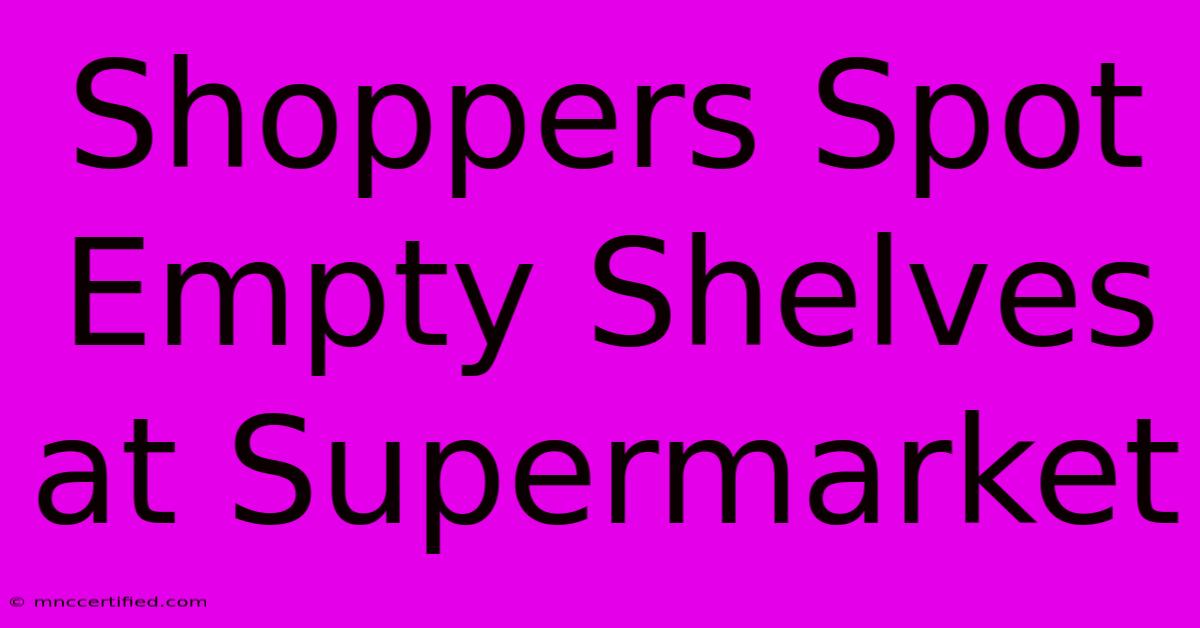Shoppers Spot Empty Shelves At Supermarket

Table of Contents
Shoppers Spot Empty Shelves at Supermarket: Supply Chain Issues or Strategic Shortages?
Empty shelves are becoming a more frequent sight in supermarkets across the nation, leaving shoppers frustrated and sparking concerns about the state of the food supply chain. But what's behind this increasingly common phenomenon? Are we facing widespread supply chain disruptions, or are supermarkets employing strategic shortages for other reasons? Let's delve into the possible explanations.
The Supply Chain Conundrum: A Perfect Storm?
The current situation is likely a complex interplay of various factors, painting a picture far more nuanced than simple shortages. Several key issues contribute to the empty shelves:
1. Global Supply Chain Disruptions: The lingering effects of the pandemic, coupled with geopolitical instability and extreme weather events, continue to wreak havoc on global supply chains. Delayed shipments, increased transportation costs, and port congestion all contribute to a reduced flow of goods to supermarkets. This is particularly evident with imported goods, where delays can be significantly longer.
2. Labor Shortages: Many sectors, including logistics and agriculture, are experiencing significant labor shortages. A lack of truck drivers, warehouse workers, and farmhands directly impacts the timely delivery and processing of food products. This bottleneck effect trickles down to supermarket shelves.
3. Inflation and Rising Costs: Increased prices for raw materials, fuel, and transportation have squeezed profit margins for producers and distributors. This, in turn, can lead to reduced production and a reluctance to stock shelves with goods that may not sell quickly enough to offset rising costs.
4. Increased Demand: While some categories see reduced supply, others experience a surge in demand. This mismatch between supply and demand exacerbates the problem, leading to quicker depletion of stock and more frequent empty shelves.
Beyond Supply Chain: Strategic Stockouts?
While supply chain issues are a major factor, some argue that strategic stockouts play a role. Supermarkets may deliberately limit the availability of certain products to:
- Drive up prices: Creating artificial scarcity can incentivize customers to pay higher prices for in-demand items.
- Prioritize popular products: Focusing stock on best-selling items maximizes profits and minimizes waste.
- Control inventory: Limiting supply can help supermarkets manage inventory more efficiently and prevent overstocking.
It's crucial to note that while these practices are possible, widespread evidence of deliberate manipulation remains limited. However, the lack of transparency around stock management makes it difficult to definitively rule out this possibility entirely.
What Can Shoppers Do?
Facing empty shelves can be frustrating, but consumers can take some proactive steps:
- Plan ahead: Create shopping lists and check supermarket websites or apps for product availability before heading to the store.
- Be flexible: Be open to substituting items if your preferred choice is unavailable.
- Support local farmers: Purchasing locally sourced produce reduces reliance on global supply chains.
- Reduce food waste: Carefully plan meals and store food properly to minimize spoilage.
The Future of Supermarket Shopping
The challenge of empty shelves is likely to persist for some time. Addressing the underlying issues – from strengthening global supply chains to addressing labor shortages – requires a concerted effort from governments, businesses, and consumers alike. Increased transparency from supermarkets regarding stock management and supply chain challenges could also help alleviate consumer anxieties and foster greater trust. Ultimately, navigating the current landscape requires a combination of understanding, adaptability, and a willingness to explore alternative shopping strategies.
Keywords: Empty shelves, supermarket, supply chain issues, food shortage, inflation, labor shortage, stockouts, strategic shortages, grocery shopping, food supply, consumer goods, product availability, shopping tips.

Thank you for visiting our website wich cover about Shoppers Spot Empty Shelves At Supermarket. We hope the information provided has been useful to you. Feel free to contact us if you have any questions or need further assistance. See you next time and dont miss to bookmark.
Featured Posts
-
No Alcohol At Aberdeen St Johnstone Fan Zone
Nov 27, 2024
-
City Vs Feyenoord Confirmed Teams
Nov 27, 2024
-
Election Petition Surges 5000 Signatures
Nov 27, 2024
-
Winston Salem Insurance Agency
Nov 27, 2024
-
Champions League Barcelona Brest Starting Xi
Nov 27, 2024